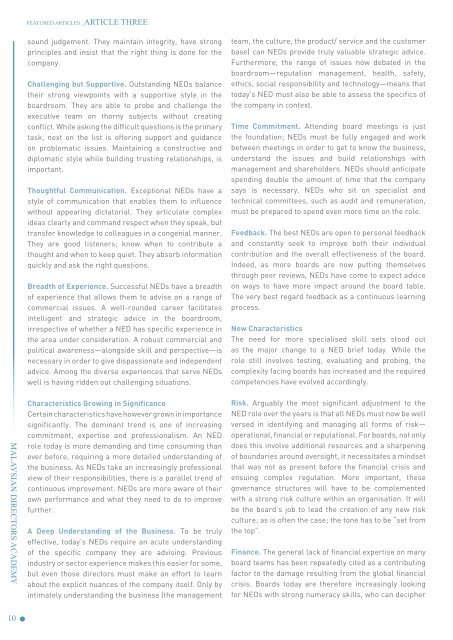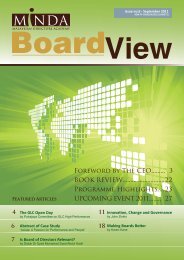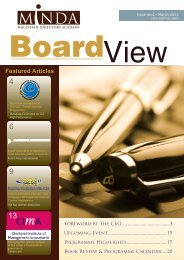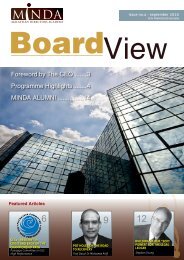HIGHLIGHTS - MINDA Malaysian Directors Academy
HIGHLIGHTS - MINDA Malaysian Directors Academy
HIGHLIGHTS - MINDA Malaysian Directors Academy
You also want an ePaper? Increase the reach of your titles
YUMPU automatically turns print PDFs into web optimized ePapers that Google loves.
FEATURED ARTICLES _ARTICLE THREEsound judgement. They maintain integrity, have strongprinciples and insist that the right thing is done for thecompany.Challenging but Supportive. Outstanding NEDs balancetheir strong viewpoints with a supportive style in theboardroom. They are able to probe and challenge theexecutive team on thorny subjects without creatingconflict. While asking the difficult questions is the primarytask, next on the list is offering support and guidanceon problematic issues. Maintaining a constructive anddiplomatic style while building trusting relationships, isimportant.Thoughtful Communication. Exceptional NEDs have astyle of communication that enables them to influencewithout appearing dictatorial. They articulate complexideas clearly and command respect when they speak, buttransfer knowledge to colleagues in a congenial manner.They are good listeners; know when to contribute athought and when to keep quiet. They absorb informationquickly and ask the right questions.Breadth of Experience. Successful NEDs have a breadthof experience that allows them to advise on a range ofcommercial issues. A well-rounded career facilitatesintelligent and strategic advice in the boardroom,irrespective of whether a NED has specific experience inthe area under consideration. A robust commercial andpolitical awareness—alongside skill and perspective—isnecessary in order to give dispassionate and independentadvice. Among the diverse experiences that serve NEDswell is having ridden out challenging situations.team, the culture, the product/ service and the customerbase) can NEDs provide truly valuable strategic advice.Furthermore, the range of issues now debated in theboardroom—reputation management, health, safety,ethics, social responsibility and technology—means thattoday’s NED must also be able to assess the specifics ofthe company in context.Time Commitment. Attending board meetings is justthe foundation; NEDs must be fully engaged and workbetween meetings in order to get to know the business,understand the issues and build relationships withmanagement and shareholders. NEDs should anticipatespending double the amount of time that the companysays is necessary. NEDs who sit on specialist andtechnical committees, such as audit and remuneration,must be prepared to spend even more time on the role.Feedback. The best NEDs are open to personal feedbackand constantly seek to improve both their individualcontribution and the overall effectiveness of the board.Indeed, as more boards are now putting themselvesthrough peer reviews, NEDs have come to expect adviceon ways to have more impact around the board table.The very best regard feedback as a continuous learningprocess.New CharacteristicsThe need for more specialised skill sets stood outas the major change to a NED brief today. While therole still involves testing, evaluating and probing, thecomplexity facing boards has increased and the requiredcompetencies have evolved accordingly.MALAYSIAN DIRECTORS ACADEMYCharacteristics Growing in SignificanceCertain characteristics have however grown in importancesignificantly. The dominant trend is one of increasingcommitment, expertise and professionalism. An NEDrole today is more demanding and time consuming thanever before, requiring a more detailed understanding ofthe business. As NEDs take an increasingly professionalview of their responsibilities, there is a parallel trend ofcontinuous improvement. NEDs are more aware of theirown performance and what they need to do to improvefurther.A Deep Understanding of the Business. To be trulyeffective, today’s NEDs require an acute understandingof the specific company they are advising. Previousindustry or sector experience makes this easier for some,but even those directors must make an effort to learnabout the explicit nuances of the company itself. Only byintimately understanding the business (the managementRisk. Arguably the most significant adjustment to theNED role over the years is that all NEDs must now be wellversed in identifying and managing all forms of risk—operational, financial or reputational. For boards, not onlydoes this involve additional resources and a sharpeningof boundaries around oversight, it necessitates a mindsetthat was not as present before the financial crisis andensuing complex regulation. More important, thesegovernance structures will have to be complementedwith a strong risk culture within an organisation. It willbe the board’s job to lead the creation of any new riskculture; as is often the case; the tone has to be “set fromthe top”.Finance. The general lack of financial expertise on manyboard teams has been repeatedly cited as a contributingfactor to the damage resulting from the global financialcrisis. Boards today are therefore increasingly lookingfor NEDs with strong numeracy skills, who can decipher10







